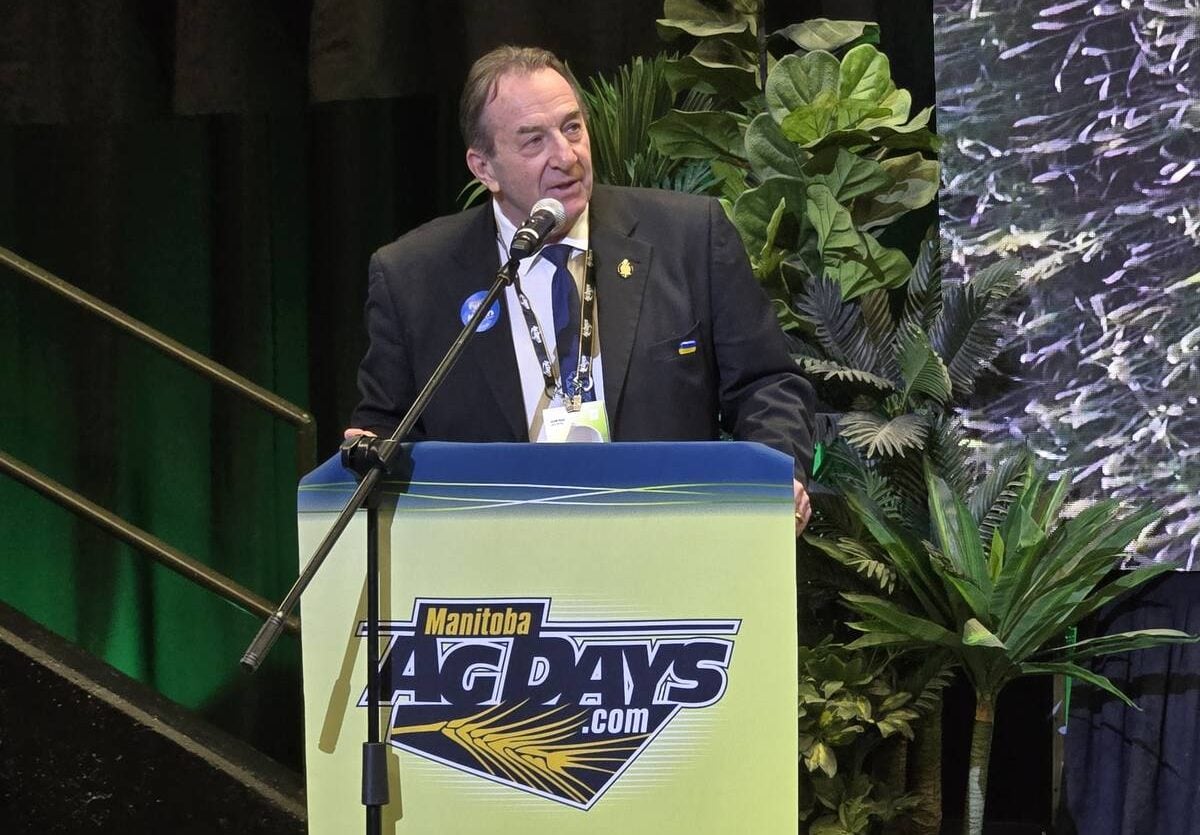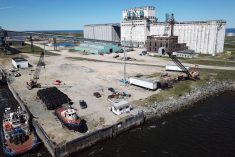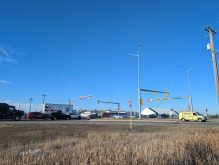The lawyers on either side of the contentious Lilyfield quarry case don’t agree on much, but they agree on one thing: the Municipal Board should be judging for itself whether the quarry in the RM of Rosser should go ahead.
During an appeal hearing Aug. 18, lawyers for both the municipality and the landowner suggested the Municipal Board of Manitoba should be rendering its own, independent verdict on the quarry rather than judging the local government’s previous denial.
Lawyers Orvel Currie, representing the RM of Rosser, and Charles Chappell, representing Lilyfield Quarry Inc., asked the board to consider the appeal a hearing de novo (legalese for “anew”). The lawyers cited similar cases before similar tribunals.
Read Also

Manitoba crop insurance expands wildlife coverage, offers pilot programs
New crop insurance coverage is available to Manitoba farmers.
Instead of reviewing if the municipality’s decision was reasonable, the lawyers argued, the board should assess the case from the beginning and come to its own conclusion.
Why it matters: The battle between residents of the RM of Rosser and Lilyfield Quarry Inc. may have implications for future developments, including hog barns, which also saw changes under Bill 19 in 2018.
The plea echoes one of two likely paths that legal experts say the Municipal Board might take in the precedent-setting case.
As the first appeal of its kind, enabled by amendments to the Planning Act under Bill 19 in 2018, the standard the board uses to review the case may set a benchmark for appeals to come.
“(This board decision) is likely to give guidance to municipalities as well as itself in future cases on the circumstances in which it will overturn a municipality’s decision to deny a quarry,” said Gerard Kennedy, a professor of administrative law at the University of Manitoba.
Kennedy told the Manitoba Co-operator that the Municipal Board is likely to take one of two approaches.
The board may judge the RM of Rosser’s decision to deny the quarry by a standard of reasonableness — only to be overturned if the municipality’s decision is deemed unreasonable — or the board might judge it on a standard of correctness, essentially starting again and turning to its own judgment as Chappell and Currie have requested.
Kennedy said if the board adopts this approach, it could mean it will give little deference to future municipal decisions on quarries.
However, taking a standard of correctness doesn’t mean the board will completely disregard the local council’s opinion. “Even though the board may not be obliged to give deference as a legal matter, it can still give respectful consideration to the municipality’s decision in coming to what it views as the correct result,” Kennedy said.
While asking for a hearing de novo, Currie asked the board to give some weight to the municipality’s previous denial. While experts from both sides had signed off on the quarry proposal as technically sound, he said the municipality was considering wider issues of residents’ social and economic welfare.
A long fight
The board’s decision should mark the end of more than a decade of wrangling over the proposed quarry site in the RM of Rosser northwest of Winnipeg.
The municipality repeatedly denied applications to build a quarry on the land. Several residents opposed the project from the start, citing concerns that it would affect their water quality, cause dust impacting residents with respiratory conditions, frighten their animals due to blasting noise and that their otherwise tranquil agricultural and residential neighbourhood would be spoiled.
Colleen Munro bought the proposed quarry site in 2015, only to have her application denied that year and again in 2018.
In 2018, Bill 19 amended the Planning Act to allow people wanting to build large-scale agricultural operations and aggregate quarries to appeal to the Municipal Board, a provincial tribunal, if they felt their applications were unjustly denied.
This is the first quarry applicant to make use of the appeal.
The Municipal Board asked the lawyers to give their opinions on the standard of review it should use, as well as its jurisdiction to add, reject or modify conditions of the proposal.
Acting board chair Tom Raine halted the hearing on July 28 and gave time for lawyers to deliver responses in writing before resuming Aug. 18. Raine cited the precedent-setting nature of the appeal for the move.
Before the latest hearings, Munro and the municipality signed a settlement agreement outlining 15 pages of conditions under which the quarry could operate should the board rule in its favour.
Currie said while the board could accept, change or add conditions as it liked, it should take the conditions, “very, very seriously,” and only ignore settlement agreements if unjust or inappropriate.
“A change of the agreed conditions will cause a chilling effect on all future matters before the board,” he wrote in his submission.
He and Chappell argued that if the board disregarded the conditions of the settlement, which the municipality put in place to address resident concerns, they’d need a three-week hearing to hash out technical details of the case.
Currie told the board that, by the municipality’s view, the two issues left to rule on were residents’ concerns voiced at the hearing and concerns around traffic safety at the intersection of Provincial Trunk Highway 6 and Provincial Road 236.
In a written submission, the municipality requested the board order the quarry not to proceed until the province implements a roundabout, traffic signals or other improvements at that intersection.
Chappell reiterated that the province recognizes the need for improvement at that intersection but the addition of 120 gravel trucks passing through twice a day won’t make the situation much worse.
He also said Munro has done everything possible to address residents’ concerns. He suggested those who still object do so in a, “NIMBY (not in my backyard) response.”
Chappell asked the board to accept the conditions without revision.
Currie added the board should consider the, “slippery slope.”
Properties around the proposed site also have significant untouched aggregate, he wrote in his submission. Permitting Munro to go forward might make it easier for other quarries to move into the area, causing accumulated damage to residents’ lifestyles.
The Municipal Board has 30 days to deliver its decision.


















